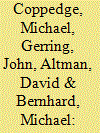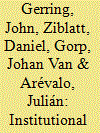|
|
|
Sort Order |
|
|
|
Items / Page
|
|
|
|
|
|
|
| Srl | Item |
| 1 |
ID:
105243


|
|
|
|
|
| Publication |
2011.
|
| Summary/Abstract |
In the wake of the Cold War, democracy has gained the status of a mantra. Yet there is no consensus about how to conceptualize and measure regimes such that meaningful comparisons can be made through time and across countries. In this prescriptive article, we argue for a new approach to conceptualization and measurement. We first review some of the weaknesses among traditional approaches. We then lay out our approach, which may be characterized as historical, multidimensional, disaggregated, and transparent. We end by reviewing some of the payoffs such an approach might bring to the study of democracy.
|
|
|
|
|
|
|
|
|
|
|
|
|
|
|
|
| 2 |
ID:
068383


|
|
|
| 3 |
ID:
140813


|
|
|
|
|
| Summary/Abstract |
According to the classical perspective, polity size and democracy are inversely related. In this article, we argue that there is an important exception that manifests itself at the district level in settings where multiparty competition is allowed. Specifically, we find that larger districts encourage greater contestation. This results from a little-noticed mechanical effect as well as from several features of constituencies that are affected by size and have direct repercussions for contestation. To demonstrate this thesis we assembled a unique dataset, the Multi-level Election Archive (MLEA), which unites electoral contests across a variety of districts (national, regional, and local) and elective offices from the eighteenth century to the present, including a total of 88 countries, 2,344 elections, 79,658 districts, and more than 400,000 contests. With this evidence we were able to conduct a broad array of statistical tests, some global and others focused on particular countries or election types, all of which support our general argument.
|
|
|
|
|
|
|
|
|
|
|
|
|
|
|
|
| 4 |
ID:
060953


|
|
|
| 5 |
ID:
106331


|
|
|
|
|
| Publication |
2011.
|
| Summary/Abstract |
Most governance arrangements involve spatial units with highly unequal powers, for example, a feudal monarchy and its principalities, an empire and its colonies, a formal empire and an informal empire (or sphere of influence), a national government and its subnational entities, or a regional government and its local entities. In this situation, the dominant unit (A) usually enjoys some discretion about how to institutionalize its authority over the subordinate unit (B). An important element of this decision concerns how much authority should be delegated to the weaker unit. The authors simplify this dimension of governance along a continuum of "direct" and "indirect" styles of rule. Why, in some cases, does one find a relatively direct (centralized) system of rule and in others a relatively indirect (decentralized) system of rule? While many factors impinge on this decision, the authors argue that an important and highly persistent factor is the prior level of centralization existing within the subordinate unit. Greater centralization in B is likely to lead to a more indirect form of rule between A and B, all other things being equal. The authors refer to this as an institutional theory of direct/indirect rule. Empirical analyses of this hypothesis are applied to patterns of direct and indirect rule (1) during the age of imperialism and (2) across contemporary nation-states. The article concludes by discussing applications of the theory in a variety of additional settings.
|
|
|
|
|
|
|
|
|
|
|
|
|
|
|
|
| 6 |
ID:
177237


|
|
|
|
|
| Summary/Abstract |
The traditional process of peer review and publication has come under intense scrutiny in recent years. The time seems propitious for a consideration of alternatives in political science. To that end, we propose a Peer Review and Publication Consortium. The Consortium retains the virtues of the traditional peer-review process (governed by academic journals) while also mitigating some of its vices.
|
|
|
|
|
|
|
|
|
|
|
|
|
|
|
|
| 7 |
ID:
170305


|
|
|
|
|
| Summary/Abstract |
It goes without saying that “leaders rule.” And it stands to reason that the background characteristics of leaders affect the way they rule. Who are the leaders of the world? We generate a composite portrait of the global political elite with data from the Global Leadership Project (GLP), the first dataset offering biographical information on a wide array of leaders in most countries of the world. We offer comparisons across office, regions, regime types, and level of development. And we enlist the variables in the dataset in a latent class model to arrive at an empirical typology of political leaders around the world.
|
|
|
|
|
|
|
|
|
|
|
|
|
|
|
|
|
|
|
|
|